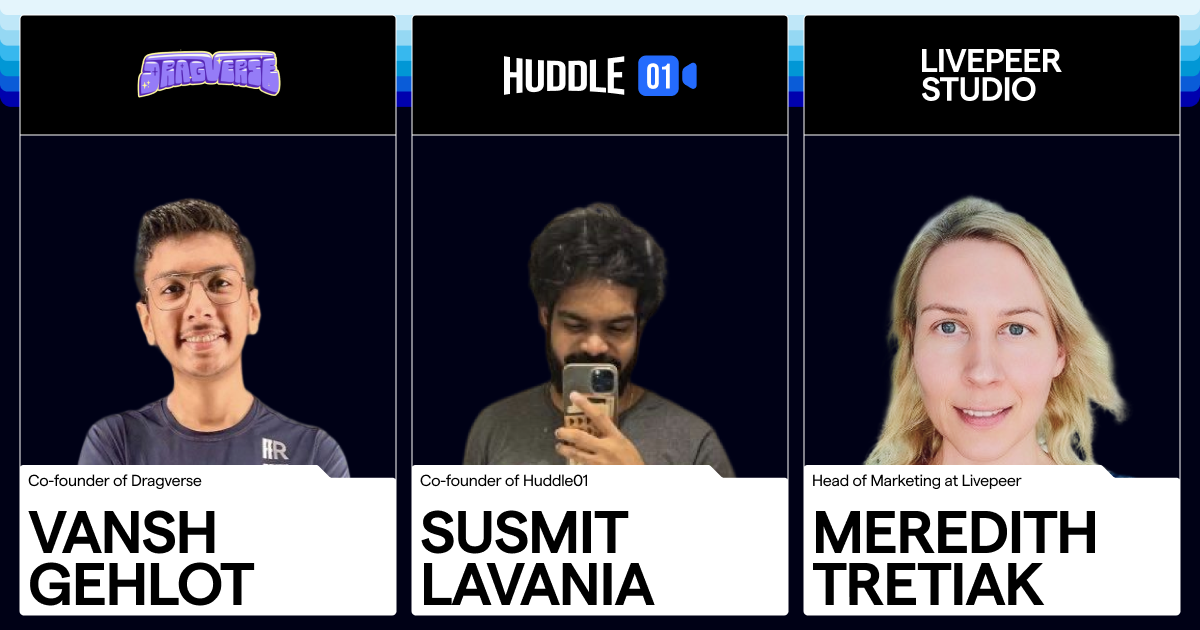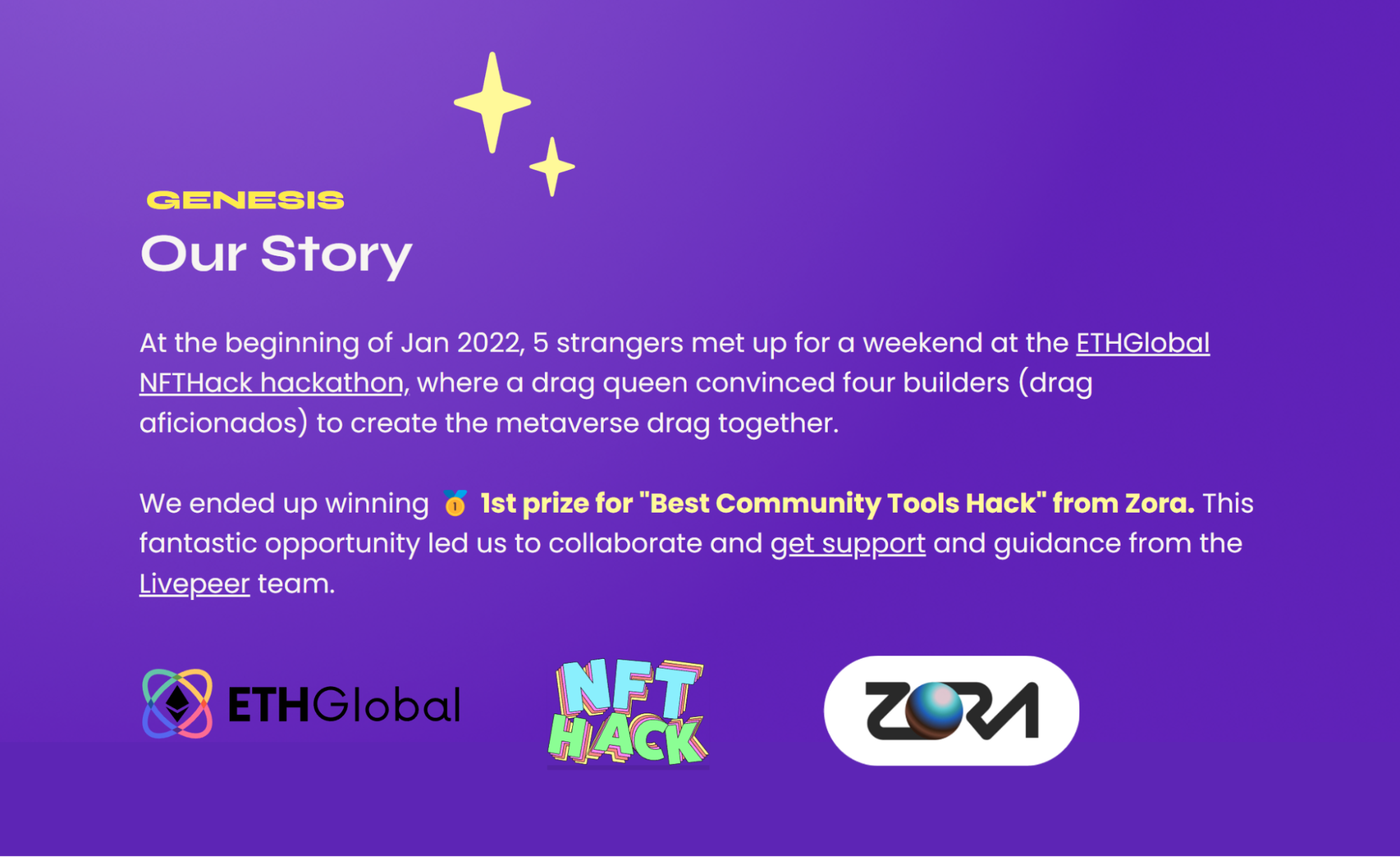The Rise of India’s Web3 Community


India is home to a massive pool of software developers. In the 1980-90’s, nearly all developers worked at large firms. In recent years, however, India has enjoyed exponential growth in local startups following its Startup India initiative launched in 2016.
Many Indian entrepreneurs and developers are transitioning into web3 despite a murky regulatory environment. Furthermore, Polygon’s $450 million funding round underlines India’s ascendency to one of the top international crypto hubs.
Livepeer Studio welcomes the next generation of Indian entrepreneurs and developers ready to build web3 video applications across this region. Meredith Tretiak, Head of Marketing at Livepeer, recently chatted with Vansh Gehlot, Co-founder of Dragverse, and Susmit Lavania, Co-founder of Huddle01, in a Twitter Space to discuss the web3 developer community in India. Below are some insights gathered from the discussion.

Web2 Walled Garden
Historically, almost all Indian software developers worked at large, established firms. Job security and high pay were enticing, and software developers made more than twice the salary of the average worker. Additionally, India’s education system was a “walled garden” that funneled students into these firms.
“People in India, they were very focused on these IITs (Indian Institute of Technology) and IIMs (Indian Institute of Management)… people used to prepare 4 or 5 years just to get into these IIT and IIM programs [because the only] data sources from where you could learn from was this teacher and [these Institutes] started becoming a huge centralized hub,” says Susmit Lavania.
Eventually, the widespread availability of the internet and online education disrupted this established system. Lavania believes “students started realizing that they could gain much more knowledge than the professor [or] the college itself.” Many Indian developers realized that following the traditional route of working at large technology firms meant limiting personal growth, receiving low-impact work, and developing overly-specialized skills. So instead, Indian developers forged alternative career paths that provided opportunities that better aligned with their interests and goals.
India’s “Progressive Decentralization”
This shift from a “job mentality” to an “entrepreneurial mentality” has been accelerated by Indian developers’ passion for web3. Web3 provides a collaborative environment for developers to build protocols and make an impact by pursuing their dreams.
“People actually want to make an impact rather than [having] job security or all of those things. They want to do something for this society in a collaborative manner. So web3 is becoming stronger and stronger, because it appeals to this [sense of community],” according to Susmit Lavania.
Interestingly, both Vansh Gehlot and Susmit Lavania noted that web2 will remain as the dominant ecosystem for the next 5-6 years and developers should be wary of ignoring web2 altogether. In their opinion, web2 technologies, like data structures and algorithms, form the foundation of web3, and the ability to combine web2 and web3 is a necessary skill.
At the same time, they envision a trend of “progressive decentralization” - a consistent transition into more decentralized technologies and organizations - in the coming decade. With non-custodial wallets, modular blockchains like Celestia, and scaling solutions like zkRollups, developers have the basic infrastructure to build competitive web3-native protocols and innovate decentralized, open-source ecosystems. Vansh specifically named AR, VR, and NFTs as technologies that will drive decentralization and eventually lead to a new era where “everyone is building on web3.”
India’s Special Charm
Lavania says India’s web3 community is “very welcoming and collaborative in nature.” Everyone works together to solve problems - “people feel whole. Your contribution matters. That's the best part.” In web3, he found a community made of like-minded, passionate people that strive to make a positive impact and constantly learn about new technologies and innovations.
Gehlot echoed those sentiments, adding “the feeling of reward and the generous nature of everyone is the [most] important thing because there is [no hierarchy]… everyone is rewarded equally… and that's what makes it different from the web2 world.” He believes web3’s influence on Indian work culture is just beginning, as “People love to be a part of these kinds of companies” and the web3 model is “the future that web2 companies should be looking into.”
Looking forward, Gehlot says that education around web3 is going to be very important. The current community is very enthusiastic and follows industry trends closely, but they are young and require mentoring to fully understand web3’s potential.
Making Web3 Friends in India
Like many countries, India’s largest cities - Bangalore, Mumbai, and Delhi - are hotspots for web3 development. Dense populations and modern facilities enable events, like conferences and meetups, for community building. In particular, Gehlot recommends hackathons as one of the best places to develop skills and build networks, which is how he became a co-founder of Dragverse. He also offered encouragement for those just starting their web3 journey, stressing that “no one should think of themselves as [inexperienced] – all of us have some unique criteria to be a part of any hackathon.”

Lavania noted the effects of the pandemic and the rise of remote work, which made online communities even more important. He recommends using resources, like Discord and Github, to build online networks and to explore web3 with a hands-on approach by testing different protocols.
Key Takeaways
India has become a hub of web3 development and venture capital investment thanks to the efforts of Startup India and the rise of online education. While every country has unique obstacles, like India’s centralized collegiate system, the positive influence of web3 and its core values of decentralization and open-source collaboration is universal. Indian developers and entrepreneurs, like Vansh Gehlot and Susmit Lavania, are excited about the “progressive decentralization” that will revolutionize Indian work culture, disrupt centralized web2 platforms, and empower their communities.